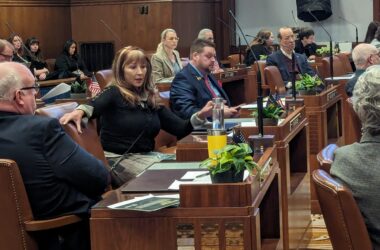State Democratic leaders say they’ve given educators, including Portland Public Schools, the money they asked for and that it will be up to the administration and unions to figure out how to use the money to meet demands of striking Portland teachers.
At a news conference on the fourth day of the Portland Public Schools’ teacher strike, hosted by lawmakers and the Portland Association of Teachers, which represents the 3,500 striking Portland teachers, state Sen. Elizabeth Steiner, D-Beaverton, said she was “frustrated” with district leaders blaming the state for leaving them underfunded to meet teacher demands and keep up with inflation.
“They’ve been in negotiations for the better part of a year,” Steiner said of Portland Public Schools’ leaders and the teachers’ union. “So when Superintendent Guerrero testified for the legislature that we should fund (all Oregon K-12 schools) at $10.3 billion, which we did, it feels a little disingenuous to have him come back and say actually, we can’t do this because you didn’t give us enough money.”
More than 40,000 students attend Portland Public Schools, the largest district in Oregon and one of the largest in the Northwest, with 81 schools. There are 197 districts in Oregon and dozens are also in contract negotiations.
In June, the state allocated more than $10.2 billion to the State School Fund, a record high, to Oregon’s K-12 public schools for the next two years. State property taxes kicked in an additional $100 million. That closed a nearly $3 billion budget gap the state’s Education Quality Commission had been raising concern about for years. The money came on top of more than $1 billion allocated to Oregon schools from the federal government during the pandemic, which districts have until 2024 to finish spending. Portland Public Schools has been allocated nearly $80 million of that money.
Still, Portland school leaders say they do not have the $372 million they say they need to raise teacher salaries by 23% over the next three years and to reduce class sizes. They also want teachers to have more planning time, behavioral health support and special education staff.
The district has proposed $143.6 million to raise salaries about 10% during the next three years.
State Sen. Michael Dembrow, D-Portland, who chairs the Senate Committee on Education, said negotiations between both sides had improved Saturday, buoyed in part by members of the Portland Public Schools’ board visiting district headquarters during negotiations. But momentum was lost Sunday, Dembrow said, when it became clear board members would stop short of going to the negotiating table to hear directly from teachers.
“At this point, the board needs to engage more directly,” Dembrow said. Jacque Dixon, vice president of the Portland Association of Teachers and a language arts teacher in Portland, joined lawmakers at the news conference.
Dixon said the union identified about $125 million the district could use to help bridge the $228 million gap, but she said the district “wouldn’t move an inch” on using that money to meet teacher demands. The bulk of that figure is district reserve money, according to Dixon.
Will Howell, communications director for the district, said half of the reserve funding is needed to maintain operations this year and the rest is savings for unforeseen expenses due to weather, government shutdowns or gaps in revenue distributions.
“There’s a $228.4 million gap,” Howell told the Capital Chronicle in an email. “Even if these figures were accurate, which they aren’t, it’s not enough.”
State Rep. Travis Nelson, D-Portland, said during the news conference that the district needs to prioritize short-term solutions so the strike is not prolonged.
“What’s happening right now is not about the long term,” he said. “It is about taking swift and immediate action to get our kids back to school. We know the resources are there to show Portland teachers, students and families that they are valued, to improve working conditions and find an agreement that works for both parties. It is now on PPS to show up.” he said.
Oregon Capital Chronicle is part of States Newsroom, a network of news bureaus supported by grants and a coalition of donors as a 501c(3) public charity. Oregon Capital Chronicle maintains editorial independence. Contact Editor Lynne Terry for questions: [email protected]. Follow Oregon Capital Chronicle on Facebook and Twitter.
STORY TIP OR IDEA? Send an email to Salem Reporter’s news team: [email protected].

Alex Baumhardt has been a national radio producer focusing on education for American Public Media since 2017. She has reported from the Arctic to the Antarctic for national and international media, and from Minnesota and Oregon for The Washington Post. She previously worked in Iceland and Qatar and was a Fulbright scholar in Spain where she earned a master's degree in digital media. She's been a kayaking guide in Alaska, farmed on four continents and worked the night shift at several bakeries to support her reporting along the way.









